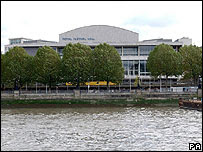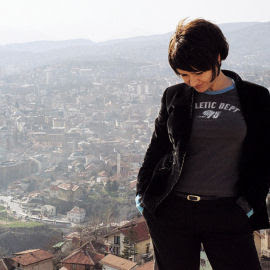
While I was pottering over the bridge in Mostar, the Royal Festival Hall opened its doors at last after its snazzy refurbishment. It's taken two years of building work and some two decades of blundering beforehand; now they're doing nothing by halves. From Friday evening until yesterday there was a grand jamboree of free music and dance inside and outside the venue. Billy Bragg led a festival of mass busking and wrote some new words for the finale of Beethoven 9; a floating chorus took to the waters of the Thames; dancing both Bollywood and ballroom was on display; 2500 school kids were involved; and 18,000 performers in all. Unfortunately I missed the lot, but going to Mostar was my own decision and in any case there's plenty more to come.
Tonight, for example. The grand first night gala: a concert in three parts with all the resident orchestras (they'll play together for the first time), two world premieres - Julian Anderson and the ubiquitous Birtwistle - plus a big party in the ballroom afterwards. Dress code is given as "to celebrate" and there'll be wall-to-wall champagne. It looks sure to be a night to remember. The big question: purple silk or sea-green linen? Either way, the tango shoes will be shown off... A full report on the state of the place will follow in due course. And from now on it's business as usual at the RFH: the LPO's first real concert is on Wednesday, with Vladimir Jurowski conducting and Imogen Cooper playing the Mozart D minor Piano Concerto; and on Thursday, the inimitable Brendel is giving a recital. Speaking of Vladimir, here's Richard Morrison's interview with our favourite resident maestro from The Times the other day.
It's going to seem weird after experiencing the Mostar opera premiere the other day, in a little theatre covered in a smallpox rash of shelling damage.









